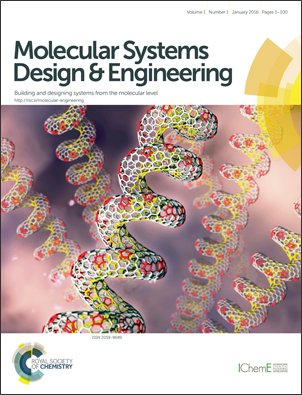
Molecular Systems Design & Engineering, the unique home for pioneering molecular engineering research, is now open for submissions.
 A joint venture between the Royal Society of Chemistry and IChemE, the journal’s mission is to forge links between disciplines and accelerate advance in molecular engineering by publishing reports of outstanding significance from all those using and developing molecular-level design and control.
A joint venture between the Royal Society of Chemistry and IChemE, the journal’s mission is to forge links between disciplines and accelerate advance in molecular engineering by publishing reports of outstanding significance from all those using and developing molecular-level design and control.
What is molecular engineering?
“I think our ability to manipulate, understand, simulate and control matter at molecular length scales has increased dramatically over the last several decades. Certainly nanotechnology is all about controlling matter at nanometre length scales, and I think what comes now with that ability – that newly gained ability – is the possibility of building devices, systems and functional materials that serve a purpose on the basis of molecular principles. That’s what I would call molecular engineering,“ says Editorial Board Chair Professor Juan de Pablo, from the University of Chicago’s Institute for Molecular Engineering. He identifies three elements that are characteristic of molecular engineering research:
- a design approach, which requires understanding and control;
- the goal of building or assembling a useful system such as a material or device;
- and, of course, doing both of these things at a very small length scales.
The work is often highly interdisciplinary because of the breadth of knowledge, expertise and equipment required to include each of these aspects.
“I don’t think there is a journal right now that really combines all of these elements, so I think that this journal will help us popularise this way of working, and the new field that we call molecular engineering” – Prof. Juan de Pablo.
Molecular engineering across the Royal Society of Chemistry
We’ve put together a collection of some key molecular engineering research from across the Royal Society of Chemistry, which we hope you enjoy reading. After you’re done, why not explore the scope of Molecular Systems Design & Engineering and send us your own best molecular engineering research now for the chance of being included in our very first issue?
Side chain engineering of n-type conjugated polymer enhances photocurrent and efficiency of all-polymer solar cells, Ye-Jin Hwang, Taeshik Earmme, Selvam Subramaniyan and Samson A. Jenekhe, Chem. Commun., 2014, 50, 10801–10804.
Digital colloids: reconfigurable clusters as high information density elements, Carolyn L. Phillips, Eric Jankowski, Bhaskar Jyoti Krishnatreya, Kazem V. Edmond, Stefano Sacanna, David G. Grier, David J. Pine and Sharon C. Glotzer, Soft Matter, 2014, 10, 7468–7479.
Emulsion-templated silica nanocapsules formed using bio-inspired silicification, David Wibowo, Chun-Xia Zhao and Anton P. J. Middelberg, Chem. Commun., 2014, 50, 11325–11328.
Biodegradable glycopolymer-b-poly(ε-caprolactone) block copolymer micelles: versatile construction, tailored lactose functionality, and hepatoma-targeted drug delivery, Wei Chen, Fenghua Meng, Ru Cheng, Chao Deng, Jan Feijen and Zhiyuan Zhong, J. Mater. Chem. B, 2015, 3, 2308–2317.
Rational molecular designs for drastic acceleration of the color-fading speed of photochromic naphthopyrans, Katsutoshi Arai, Yoichi Kobayashi and Jiro Abe, Chem. Commun., 2015, 51, 3057–3060.
Mechanical properties of self-assembled nanoparticle membranes: stretching and bending, Yifan Wang, Pongsakorn Kanjanaboos, Sean P. McBride, Edward Barry, Xiao-Min Lin and Heinrich M. Jaeger, Faraday Discuss., 2015, 181, 325–338.
A photoswitchable supramolecular complex with release-and-report capabilities, Jesper R. Nilsson, Melanie C. O’Sullivan, S. Li, Harry L. Anderson and Joakim Andréasson, Chem. Commun., 2015, 51, 847–850.
Inhibition of atherosclerosis-promoting microRNAs via targeted polyelectrolyte complex micelles, Cheng-Hsiang Kuo, Lorraine Leon, Eun Ji Chung, Ru-Ting Huang, Timothy J. Sontag, Catherine A. Reardon, Godfrey S. Getz, Matthew Tirrell and Yun Fang, J. Mater. Chem. B, 2014, 2, 8142–8153.
To keep up with the latest news from Molecular Systems Design & Engineering, be sure to sign up to our e-alerts and follow us on twitter @RSC_MolEng.










